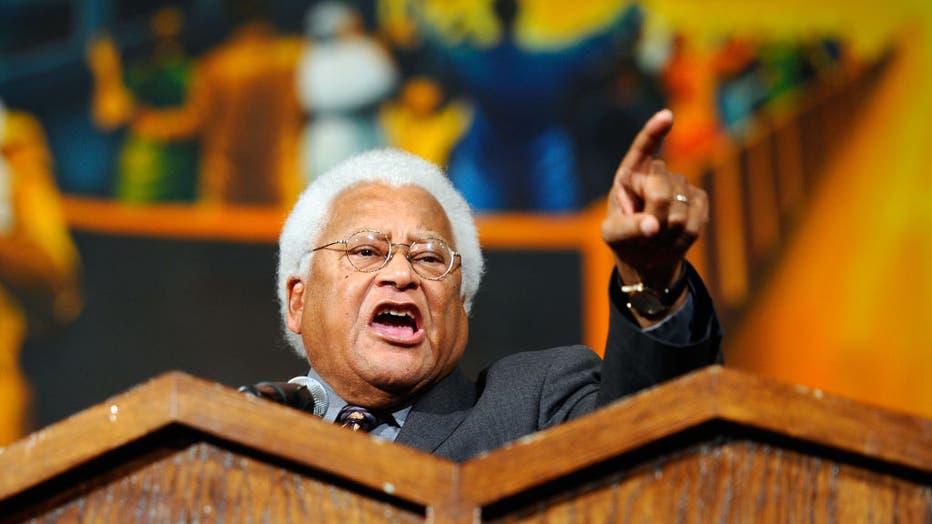Rev. James Lawson Jr., icon of the Civil Rights Movement and longtime LA pastor, dead at 95
LA civil rights icon Rev. James Lawson Jr. dies
Los Angeles' civil rights icon Rev. James Lawson Jr. has died at 95.
LOS ANGELES - The Rev. James Lawson Jr., an icon of the Civil Rights Movement and the longtime pastor of Holman United Methodist Church in Los Angeles, died Monday at age 95.
According to the Los Angeles Sentinel, which first reported the news, Lawson died Monday morning from cardiac arrest. No other details were immediately available.
Los Angeles City Councilwoman Heather Hutt, who led a street-dedication ceremony for Lawson in January outside Holman UMC, confirmed the death, telling City News Service in a statement: "Reverend James Morris Lawson was a leader of our community and world, whose messages of love and nonviolence left an indelible mark on the Civil Rights Movement and influenced many. I am deeply saddened to hear of his passing, but know his legacy will continue to guide us for generations to come. His message of love will forever live on in every heart he touched. May he rest in power."
Lawson was pastor of Holman United Methodist Church from 1974 until his retirement in 1999. A mile-long stretch of Adams Boulevard from Crenshaw Boulevard to Arlington Avenue in front of the church was co-named in January as the Reverend James Lawson Mile.

Rev. James Lawson speaks from the pulpit of the First AME Church during an event in solidarity with union workers in Wisconsin on the anniversary of Dr. Martin Luther King Jr.s assassination on April 4, 2011 in Los Angeles, California. Labor unions
Born James Morris Lawson Jr. Sept. 22, 1928, in Uniontown, Pennsylvania, the son and grandson of Methodist ministers, Lawson was raised in Massillon, Ohio.
While a student at Baldwin-Wallace College in Berea, Ohio, Lawson was drafted by the U.S. Army, but refused to serve due to his belief in nonviolence and was sentenced to two years in prison.
Released after 13 months, Lawson returned to college to finish his education, then traveled to Nagpur, India as a Methodist missionary to study the nonviolence resistance tactics developed by Mahatma Gandhi.
Lawson returned to the United States in 1956, entering the Graduate School of Theology at Oberlin College in Ohio. According to a biography from the Stanford University-based Martin Luther King, Jr. Research & Education Institute, one of Lawson's Oberlin professors introduced him to King, who had also embraced Gandhi's principles of nonviolent resistance.
In 1957, King urged Lawson to move to the South telling him, "Come now. We don't have anyone like you down there." He moved to Nashville, Tennessee where he attended Vanderbilt University and began teaching nonviolent protest techniques.
In February 1960, following lunch counter sit-ins initiated by students at a Woolworth's store in Greensboro, North Carolina, Lawson and several local activists launched a similar protest in Nashville's downtown stores. More than 150 students were arrested before city leaders agreed to desegregate some lunch counters.
Lawson was expelled from Vanderbilt in March 1960 because of his involvement with Nashville's desegregation movement. Lawson eventually reconciled with Vanderbilt and returned to teach as a distinguished university professor. Vanderbilt established a institute for the research and study of nonviolent movements bearing his name in 2021.
Lawson participated in the 1961 Freedom Rides which challenged segregation on interstate buses and bus terminals.
Lawson became pastor of Centenary Methodist Church in Memphis, Tennessee in 1962. In 1968, when Black sanitation workers in Memphis began a strike for higher wages and union recognition after two of their co-workers were accidentally crushed to death, Lawson served as chairman of their strike committee.
Lawson and King led a march in support of the strikers on March 28, 1968, which erupted in violence and was immediately called off.
In what would be his final speech on April 3, 1968, one day before his assassination, King spoke of Lawson as one of the "noble men" who had influenced the Black freedom struggle.
"He's been going to jail for struggling; he's been kicked out of Vanderbilt University for this struggling; but he's still going on, fighting for the rights of his people," King said.

